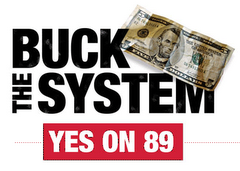Problems with Pledging
Brian Josepth in the Orange County Register brings up a good point:
Pledging muddles campaign finance pictureThis is another sickening example of why strict disclosure requirements simply are not enough. And this isn't an isolated incident:
Legislators accept promises instead of cash, confounding watchdogs who want to know who is trying to influence bills as the session winds down.
SACRAMENTO - On paper, it looked like a total failure.
Orange County Assemblyman Chuck DeVore hosted a fundraiser Aug. 15 but the next day reported no new contributions to his campaign. That's not exactly raking in the cash.
But it actually wasn't a failure – the checks just hadn't arrived. DeVore, like many California lawmakers, is taking advantage of a new twist in the campaign finance world: accepting pledges from attendees. The money would come later.
Until then, it's impossible to know exactly who is financing DeVore. The state's campaign disclosure regulations only require candidates to report the day when a contribution is received, not the day when the promise is made.
The difference is important, campaign finance watchdogs say, because as the legislative session ends Thursday lawmakers are holding fundraisers to cash in on interest groups with bills to push.
It's unknown how widespread pledging is, but an Orange County Register review of campaign disclosure forms found 14 examples of sitting lawmakers who scheduled $1,000-a-ticket or more fundraisers this month but didn't report receiving any new contributions the next day. State law says that candidates this close to the Nov. 7 election have to report contributions of $1,000 or more to the secretary of state within 24 hours of receipt.This new trick of evading accountability utterly destroys the argument that disclosure is the only safeguard necessary.
The Register found 35 cases where lawmakers reported at least one contribution on the day of a fundraiser or the day following, with the most being seven contributions the next day. Lawmakers who aren't running for election in November but hold fundraisers now aren't required to report contributions within 24 hours.
In all, sitting lawmakers scheduled more than 90 fundraisers this month, compared with about four in July, when the Legislature was on summer recess.
Political insiders say they can't pinpoint when the practice of pledging started, but watchdogs say it's a new phenomenon.The best way to describe pledging?
"This is the first time I've heard about it," said Bob Stern, former general counsel for the California Fair Political Practices Commission and author of the Political Reform Act of 1974. He said the practice undercuts the intent of the state's disclosure laws.
"It has opened the door for abuse," Stern said. "You no longer can figure out when the contributions are being made. It evades the date question." [...]
Robert Flanigan, an account manager for Capital Campaigns, which organized the DeVore event and events for President Bush, Gov. Arnold Schwarzenegger and Orange County Sheriff Mike Carona, said that "99 percent of the time" pledges are good.
"It's like Enron accounting for politicians," said Doug Heller, executive director for the Foundation for Taxpayer and Consumer Rights and a vocal critic of end-of-session fundraisers.To clean up pledging, pledge to support Proposition 89 by signing up for email updates.
"That's a total evasion of the disclosure expectations we have of politicians. The reason we have disclosure is because we want to have confidence that politicians are not making decisions based on contributions."


